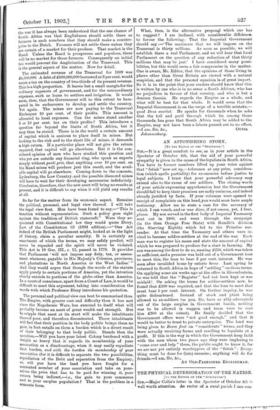AN ASTONISHING STORY.
[To THE EDITOR OF THE " SPECTATOR:1 Srn,—It is a great comfort to see, as in your article in the Spectator of October 4th, that the aid of your powerful sympathy is given to the cause of the loyalists in South Africa. You have in former numbers lifted up your voice against that "fetish" now set up,—tolerance at any price, considera- tion (which spells partiality) for ex-enemies before justice to loyal subjects. I trust that your powerful advocacy may extend also to the cause of our soldiers. The closing words of your article expressing apprehension lest the Government should fail to keep their promises are sadly ominous, and indeed already justified by facts. If your columns were opened to receipt of complaints on this head,you would soon have ample testimony. Allow me to state a case for the accuracy of which I can vouch, and ex uno disce, if not omnes, yet, I fear, plures. My son served in the first body of Imperial Yeomanry sent out in 1900, and went through the campaign (in the then Orange Free State) with Rundle's division (the Starving Eighth) which led to the Prinsloo sur- render. At that time the Yeomanry and others were in- vited to become soldier-settlers at the end of the war. Each man NM to register his name and state the amount of capital which he was prepared to produce for a start in farming. My son was among the first to do so, naming £250, which was taken as sufficient, and a promise was held out of a Government loan to meet this, the loan to bear 3 per cent. interest. He was soon after invalided home by enteric fever. Last spring he returned to South Africa in hope of " settling " on those terms. On applying some six weeks ago at the office in Bloemfontein, he was told that the "Register" had not been kept or was mislaid ! On asking the terms for soldier-settlers now, he found that 2500 was required, and that the loan to meet that must bear 5 per cent. interest. On further inquiry, he was quite disheartened. Instead of stock and plant being allowed to ex-soldiers (as you, Sir, have so ably advocated) out of the large surplus in Government bands, nothing was to be allowed (a waggon and team were to cost him 2300 at the outset). He finally decided that the Government offers were "not good enough," and that it would be better to trust to private enterprise. The land was being given to Boers first on " considerate " terms, and they were actually receiving farms and reselling to loyalists at a profit. If this is the way in which the Government keep faith with the men whom two years ago they were imploring to "come over and help" them, the public ought to know it, for we are not yet entirely worshippers of the " fetish " : Every- thing must be done for (late) enemies ; anything will do for friends.—I am, Sir, &c.,
AN OLD-FASHIONED ENGLISHMAN.










































 Previous page
Previous page